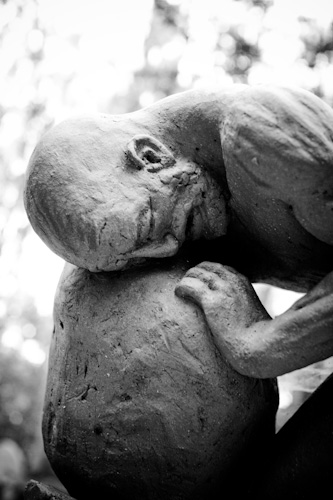
Happiness in a meaningless Universe
Second-year Psychology students participating in the University Honours College follow a workshop on Blogging Science, in which they learn to communicate science to the general public by means of informing, giving an opinion, and relating science to issues in society. A selection of these blog posts is published on Mindwise. Today’s post is by Lena Duiverman.
Why am I here? What is my purpose in life? What is the source of my happiness? Is there a greater meaning to my existence at all?
If these are questions you recognize as having asked yourself in the past, you are certainly not the only one. Humans have struggled with these existential questions for centuries through the means of philosophy. However, when these struggles turn into a forms of depression or addiction, people typically turn to psychology to find a cure or at least a relief from the suffering. And here, at the crossroads of psychology and philosophy, we find existential therapy. Although the research on existential therapies is still very slim, so far there are signs that it could be an effective form of therapy for mental disorders such as depression and addiction (Vos, Craig, & Cooper, (2015).
The idea of existential therapy is that learning who you are as a person, how you think and feel, helps you to become more aware of, and able to overcome, internal conflicts (counselling-directory). Some of the fundamental ideas of the therapy are that life is unpredictable, imperfect and in essence meaningless; you are both free to choose what you will, yet you are forced to make a choice; and by taking responsibility for your life you bring meaning into it (van Deurzen, 2019).
” Life is unpredictable, imperfect and in essence meaningless; you are both free to choose what you will, yet you are forced to make a choice”
The key premise of the philosophy of existentialism and absurdism is that you that you have the power over your own life and your own happiness. In 1942, Albert Camus published an essay called the myth of Sisyphus. Sisyphus had managed to anger the Gods, for a reason still unclear, though it is most commonly thought that he played the Gods because he loved life just too much. The Gods decided to punish Sisyphus by forcing him to push a large rock up a hill, only every time Sisyphus had almost reached the summit, the boulder would roll back down, and Sisyphus follows the rock down to restart the process of rolling the rock back up the hill. An endless cycle.
Now, you may ask, how does this story relate to existential therapy? On the myth of Sisyphus, Camus writes “It is during that return, that pause, that Sisyphus interests me. That is the hour of consciousness.” Sisyphus can be thought as being aware of the absurdity of his existence, but in his awareness he can either let this absurdity be his torture or the creation of his own fate. In his awareness Sisyphus makes the choice to follow the rock back down and to push it back up. And in his choice the Gods have no power over him, they can no longer torture him with a futile existence. He chooses to pick his burden back up. And when Sisyphus follows the rock down the hill, he is stronger than his fate, he is stronger than his rock.
“Sisyphus can be thought as being aware of the absurdity of his existence, but in his awareness he can either let this absurdity be his torture or the creation of his own fate.”
We are all Sisyphus, we are all condemned to see our rocks roll down the hill for the rest of our life, and we choose to follow it down and roll it back up the hill. This is where we could benefit from existential therapy, learning to accept the meaninglessness and unpredictability of life. Here we may need to see that our strength is in the choices we will always have to make. There is no happy ending in life, because there is no endpoint to reach. Life goes on and our rocks will inevitably roll down the hill again at some point. Our innate drive for survival makes us strong enough to choose to pick our rocks back up, and push it up the mountain once again.
This is also where the purpose of life can be found, in the continuous struggle to the top, regardless of whether you find yourself at the foot of the hill or nearing the top. As long as you choose to continue to roll your rock up the hill, you managed to create your own fate, you are stronger than your rock.
That is meaning, that is existence, that is life.
References
Camus, A. (1965). The myth of Sisyphus, and other essays. London: H. Hamilton.
van Deurzen, E. (2019). Facing an uncertain future: The next 30 years of existential therapy. Existential Analysis, 30(1), 4–17.
Vos, J., Craig, M., & Cooper, M. (2015). Existential therapies: A meta-analysis of their effects on psychological outcomes. Journal of Consulting and Clinical Psychology, 83(1), 115–128.
NOTE. Image by Paul Burnett.



